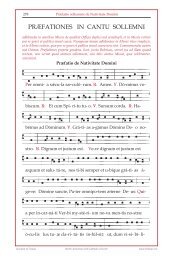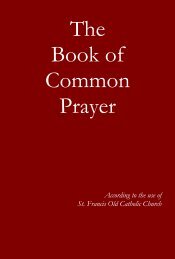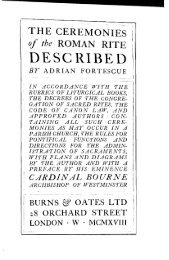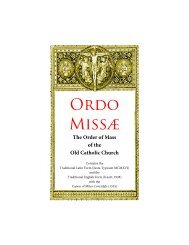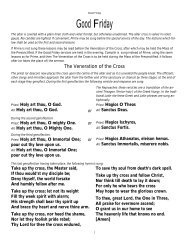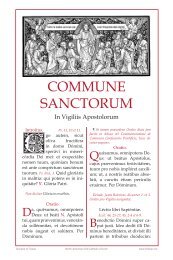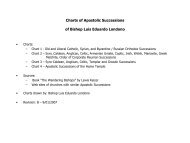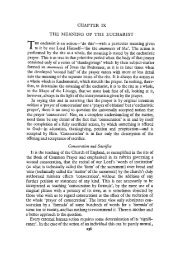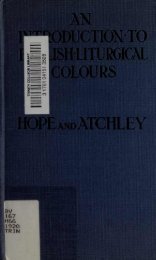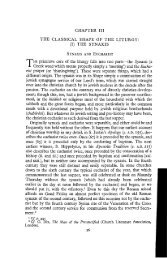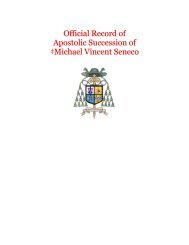Eucharist and Lord's Supper
Eucharist and Lord's Supper
Eucharist and Lord's Supper
You also want an ePaper? Increase the reach of your titles
YUMPU automatically turns print PDFs into web optimized ePapers that Google loves.
THE SHAPE OF THE LITURGY<br />
deliberate misstatement, which would ruin the whole effect of the epistle.<br />
Nor does it really savethe apostle's credit to suppose that he had hypnotised<br />
himself into believing that a story emanating from his own imagination<br />
was factual history, <strong>and</strong> that 'I received by tradition (parelabon) from the<br />
Lord that which I also h<strong>and</strong>ed on as tradition (paredoka) to you' really<br />
means 'I had by revelation from the Lord' in trance or vision 'that which I<br />
h<strong>and</strong>ed on to you as historical tradition.'l He certainly did put confidence<br />
as a rule in his own mystical experiences, but he himself would not have<br />
men to be at the mercy of such gifts. 2 Such a theory does not in fact tally<br />
with the apostle's usage of words. He uses precisely the same phrase in this<br />
epistle of a whole series of historicalstatements about our Lord which does<br />
unquestionably proceed from the original apostles <strong>and</strong> the Jerusalem<br />
church. 'When I first taught you I h<strong>and</strong>ed on to you as tradition (paredoka)<br />
what I had received as tradition (parelabon) how that Christ died for<br />
our sins ... <strong>and</strong> that He was seen by Cephas, next by the twelve. Then He<br />
was seen by above 500 brethren at one time ... then He was seen by<br />
James, next by all the apostles.'3 In the face of such evidence the 'Vision<br />
theory' really should not have been put forward as a piece of scientific<br />
scholarship; these are the resorts of a 'criticism' in difficulties. As Harnack<br />
once remarked, the words of S. Paul in I Cor. xi. 24 'are too strong' for<br />
those who would deprive them of their meaning.<br />
The responsibility for the historical truth of the 'Pauline' tradition of<br />
the last supper, rests therefore-or was intended by S. Paul to rest-not<br />
on S. Paul but on the Jerusalem church, <strong>and</strong> ultimately on Peter <strong>and</strong> those<br />
others at Jerusalem who were the only persons who had been present at<br />
the supper itself. Ifone considers carefully the contents of the supposedly<br />
'Petrine' tradition in Mark xiv. (which is verbally independent of I Cor.<br />
xi.) S. Paul's reliance on this derivation seems justified. I Cor. expresses<br />
that tradition in a more primitive form, rougWyat the stage when S. Paul<br />
first learned it-within ten years at the most of the last supper itself, perhaps<br />
within five.The account in Mark xiv. expresses the same tradition in<br />
the form which it had reached when Mark was written, ten years or more<br />
later than I Cor. <strong>and</strong> thirty years at least after the last supper. As one would<br />
expect, the earlier account is the more dire~tly ~actual, mo~e concer?ed<br />
simply with 'what happened'. The later one IS still accurate III essentIals,<br />
but compared with that in I Cor. xi. it has 'worn smoother' in the course<br />
of time, <strong>and</strong> become to some extent 'ecclesiasticised'in its interest.<br />
Rome (c. A.D. 160). The greatest hellenistic historian of our time, Eduard Meyer,<br />
has gone so far as to say 'How the fa~ t~at Peter visited Corin.~h has ever cc:meto be<br />
questioned passes my comprehensIOn (Ursprung und Anfange des ChTlstentums,<br />
iii. 44 1 )., P G d Th R Z' .<br />
1 This is the theory put forward (rather less baldly) by . ar ner, e e IglOUS<br />
Experience of S. PauZ,pp. IIO sq.<br />
• Cj. I Cor. xiv. . Phil' Th<br />
• I Cor. xv. 3-6; cf. S. Paul's usage ibid. xv. I; Gal. I. 9; . IV. 9; less.<br />
ii. 13; iv. 1,2; 2 Thess. iii. 6.



